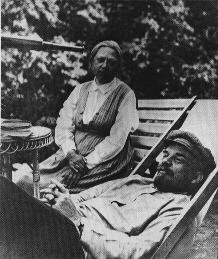Marxism and Enron at Sunday Dinner

From Norm "The Red" Gover
Friends--
We meet this Sunday. I offer this collage, below. It is not profound. It is not definitive. It is, I think, germane. We get along as we can.
More recently, editorial writers at the Allentown, Pa., Morning Call dusted off their Marx in the wake of the Enron scandal: "For several years, we have been told that Marxism is now a defunct doctrine. However, the apparent collusion of our ‘democratically elected’ leaders in the deceitful (though quite profitable) methods of the firm called Enron should lead us to be less hasty in dismissing Marx as a total lunatic. At least one of the statements of Marx and Engels in the Communist Manifesto prompts renewed attention. "The bourgeoisie has stripped of its halo every occupation hitherto honored and looked up to with reverent awe. It has converted the physician, the lawyer, the priest, the poet, the man of science into its paid wage laborers."
Marxism’s relevance, as the New Yorker’s Cassidy put it, lies in Marx’s "riveting passages about globalization, inequality, political corruption, monopolization, technical progress, the decline of high culture, and the enervating nature of modern existence--issues that economists are now confronting anew, sometimes without realizing that they are walking in Marx’s footsteps."
Much can be said about the accomplishments of the Russian Revolution, however short-lived--from ending Russia’s participation in the carnage of the First World War, to the first experiments in workers’ control of production, to the active effort to emancipate women. But what is at least as impressive is the way in which the revolution brought to life masses of people condemned to, at best, a life of long and anonymous labor. In the accounts of the revolution, you sense the expanding horizons of people taught all their life to be obedient and docile, who suddenly find themselves in a new world where what they think matters.
Krupskaya, a veteran member of the Bolsheviks and Lenin’s wife, captured this in her memoirs: "The streets in those days presented a curious spectacle: everywhere, people stood about in knots, arguing heatedly and discussing the latest events...These street meetings were so interesting, that it once took me three hours to walk from Shirokaya Street to the Krzesinska Mansion. The house in which we lived overlooked a courtyard, and even here, if you opened the window at night, you could hear a heated dispute. A soldier would be sitting there, and he always had an audience--usually some of the cooks, or housemaids from next door, or some of the young people. An hour after midnight, you could catch snatches of talk--"Bolsehviks, Mensheviks..." At three in the morning, "Miliukov, Bolsehviks..." At five--still the same street-corner meeting talk, politics, etc. Petrograd’s white nights are always associated in my mind with those all-ni ght political disputes."
And, lest one come to think the Left has no sense of humor:
George Bush:
"If people want to get to know me better, they've got to know my parents and the values my parents instilled in me, and the fact that I was raised in West Texas, in the middle of the desert, a long way away from anywhere, hardly. There's a certain set of values you learn in that experience."
norman
- - - - - - - - - - - - - - - -


0 Comments:
Post a Comment
<< Home